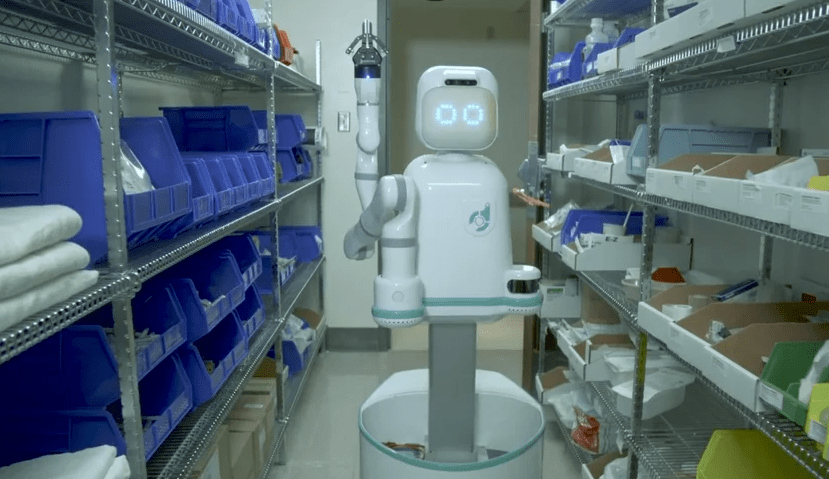Studies show that almost 28% of a professional nurse’s working time goes into tasks that require low-skill and less technical knowledge. These tasks include taking medical tools from places and handing them over to the doctor-in-charge. Being a nurse is an essential job that requires a lot of other complex operations, which require care and compassion. When they are put under stress working on low-skill tasks, this affects the overall productivity and efficiency. The present COVID-19 attack has seriously put the medical profession under severe pressure. With doctors and nurses having to work around the clock to save lives, the least we can do is use science to make their lives easier. In this article, we will be taking a look at what the start-up Diligent Robotics is doing to help these nurses out.
Robots to the Rescue
Diligent Robotics is trying to give back to the medical community by providing them with a helper robot to carry out low-task jobs. This robot will function as a sort of assistant to these nurses, helping them with errands around the clock. The company’s helper bot, called Moxi has a flexible gripper-equipped arm, which allows it to pick and drop things. This incredibly mobile robot can navigate its way through a hallway, clinical room or ward and assist nurses diligently. It can be put to use to transport resources from one department to the other, and hand over necessary documents to doctors. Since the world is facing a massive shortage of human resources with regards to the healthcare industry, this robot will help save lives. Using this robot will lead to medical professionals having more time to tend to the sick, instead of engaging in low-intensity tasks. This will help raise the overall efficiency and productivity of the hospital and its staff. Furthermore, since robots cannot get themselves infected with COVID-19, they cannot be carriers, making the entire process a lot safer.
Funding on Board
The company Diligent Robotics announced its plan to scale operations and deliver more robots to hospitals, thanks partly to a $10 million received via Series A funding. Diligent Robotics CEO Andrea Thomaz has said that the robot Moxi was designed by taking input from hospital customers and users so that it can provide more solutions than just material management. The company plans on making the robot a frontline staff in this fight against the disease. This round of funding led by DNX Ventures ensured that the company gained $15.75 million in total funding. This has pushed development works into fifth gear as far as Moxi is concerned. Two such robots are working in Dallas, within two top hospital networks inside the United States.
Road to the Formation of the Rescue Team
The new cash which has come in from companies and investors such as DNX, Ubiquity Ventures, Grit Ventures, and E14 Fund has helped in expanding Moxi’s capabilities. Andrea Thomaz came up with this idea when she was working on her Ph.D. from MIT Lab in the field of social robotics. Co-founder and the company’s CTO, Vivian Chu has a Master’s from UPenn. She then joined forces with Thomaz at Georgia Tech and realized just how much time nurses waste on menial tasks. This study led them to win a National Science Foundation grant amounting to $750,000. This money proved that stepping stone that led to the prototype of Moxi being built. Since then, the company has grown from strength to strength, expanding into an 18-member team. They worked with over a hundred nurses from all over the US, to study their needs and requirements. Thomaz believes that such movements will help in the integration of robots into everyday lives like never before. Hence, such service robots will benefit the entire field move from shop floors and industries to our homes and essential services. Rather than trying to replace humans, the company is trying to focus on building robots with unique human elements in them.
Moxi the Bot
Moxi is almost as big as a human but looks more like an 80’s inspired movie robot so that it does not make people feel weird. It has a pair of eyes that move as per signal transmission, with a command system that responds to voice commands from nurses. It has a control system inside it, which allows it to adjust its height, while its robotic arms will enable it to pick up and place items whenever necessary. Hospitals buy Moxi by paying a standard fee and then continue to pay a small monthly fee for the services it provides. While hospitals find it difficult to adjust to new technologies, the start-up believes that tough times will inspire more companies and hospitals to adopt new technologies to fight the pandemic.

Being a cinephile with a love for all things outdoorsy, Athulya never misses a chance to chase inspiring stories or poke fun at things, even when the subject is herself. Currently pursuing a degree in mechanical engineering, she is someone innately interested in technical and scientific research. Music reviews and op-eds define her as they allow her to explore different perspectives. Though sometimes she thinks she makes more sense playing the guitar than she does while writing.
